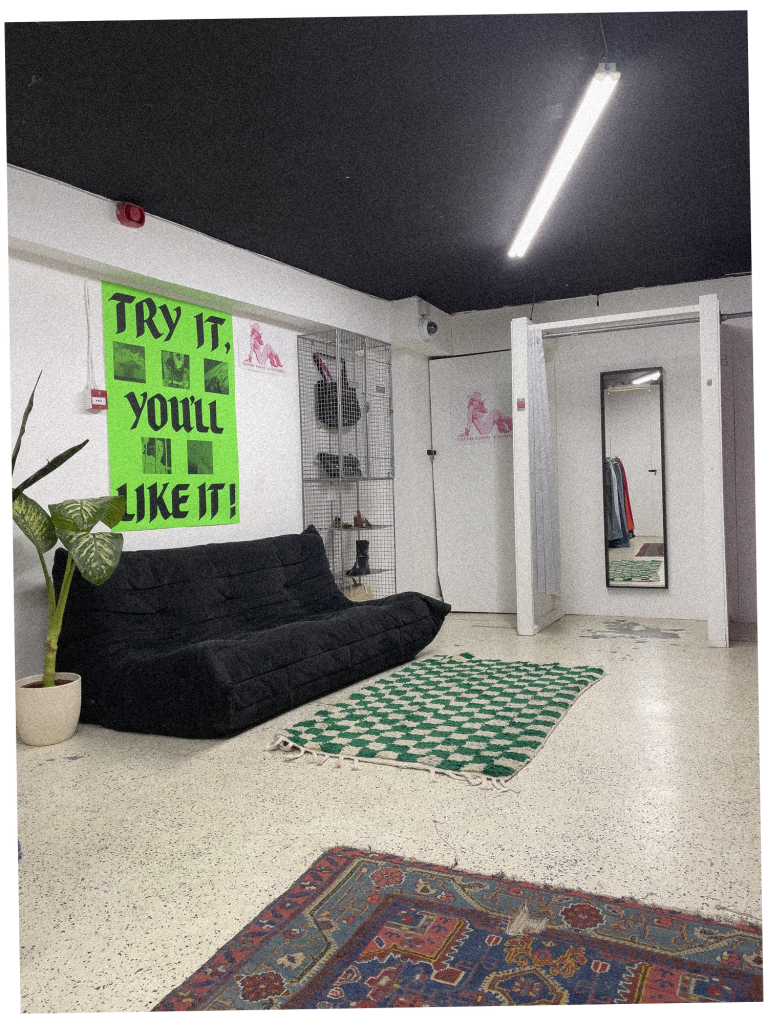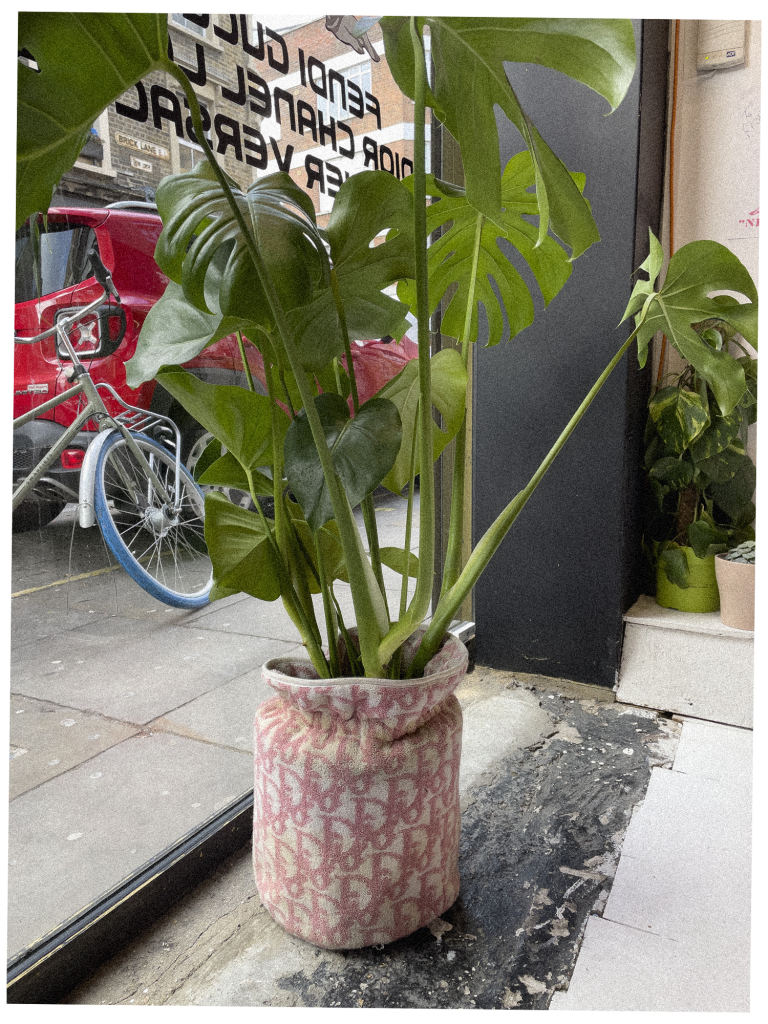BasementApproved heads down to your favourite womenswear vintage store in London, Serotonin Vintage to talk Brick Lane, rare finds, and the highs and lows of owning a business through the pandemic.
As we all know, vintage shopping is the best way to elevate your wardrobe with unique pieces – not to mention a way to buy and consume clothes without feeling shit about it. For those living in Shoreditch, often heading to Brick Lane — London’s Vintage Mecca — for a wander, to grab food or a shop, Serotonin has become an absolute go-to for vintage womenswear. Hours of trawling through their rails, endless requests for staff go through the back for that one essential piece. Home to a team with boundless passion and energy for the store and its wares, it’s become near impossible to pass through Brick Lane without stopping by to say hi to Ben – the store’s man man – to check out the latest pieces they’ve sourced. Shoutout to Ben every time.
So famed has Serotonin’s collection become that, beyond serving as a shop, it has developed into a vintage showroom of sorts, frequented by London’s fashion scene when a particular archive item or look is needed for a shoot or event. For stylists and styling assistants alike, the store is known as a haven of rare and fun pieces we had never seen before. Every time you visit Serotonin, you’ll see something different on the walls that you didn’t spot last time. The interiors are are spot on too – think diamanté leather, leopard print furry chairs, neon pink walls, loud and funny tee graphics and monogram pieces from rail to rail.
Having an authentic family set up – Rachael owning Serotonin and brother Elliot owning 194 Local just a few doors down – BasementApproved paid the store a visit to chat all things east London and the “luxury, sexy, and mosher” product assortment at Serotonin Vintage.


When and why did you open Serotonin. Where did the love of women's vintage come from?
I officially opened Serotonin as a bricks and mortar store on Brick Lane in 2016, but before that I had been collecting and selling on depop in its early days. It’s really cool to see how a whole community and culture has built up around it. When I started, there really wasn’t anyone doing what I wanted to do in London. I’ve always been into luxury and vintage fashion, and when I studied for a term in America it really let me explore flea markets and find loads of things you couldn’t ever get in the UK at that time. America has always been years ahead, so it was cool to meet people there and of course Hollywood is the home of cute trashiness so it was just a perfect storm really.
Tell us a bit about the store and your vision for it?
I am a die hard emo and I think that’s what really set Serotonin apart from anyone else in the early days because most people selling vintage and luxury fashion were either coming from the clean archival side of things or from the clubbing/garage/2000s side. I haven’t really been a part of those cultures but I grew up with punk and have always styled things that way for myself, so I thought it would be cool to have a store that had a spin from that side of things which is really true to who I am. It’s leathers, it’s neon animal prints, loud graphics and sheer fabrics… sort of luxury, sexy, mosher – if I had to sum up in three words.


What do you love about London?
London will always be the best because it brings together people that see things a little differently, all the best things come from weird and unusual subcultures and those things are really given a place to thrive in the city. The UK is full of tiny towns and it can make you feel like an alien even dressing the slightest bit different to anyone else.
What do you love about Brick Lane and the local community?
Brick Lane has definitely changed a lot over the years, some good and some bad, but ultimately the best thing is that there are lots of younger people going out and doing it for themselves. I think with the accessibility of online selling combined with Instagram becoming a fashion inspo app, its shown people that starting your own business is something achievable and that they can eventually move into bricks and mortar stores which is the dream really.
When you come to Brick Lane, there will always be someone dressing crazier than you so it kind of makes you feel at home, makes you feel like you can dress how you want and people are going to tell you that you look fabulous.
The coolest thing is that people get that you need your own identity, there’s no point just copying someone else’s store because we all just want people to really connect with what you’re doing. Although there are loads of people selling vintage and designer in the area, we all have our own personalities and I think it ends up being this place where you know you’re going to love at least one store on the street.


What are some of your favourite brands and things that you stock in the store?
It’s too hard to pick but we always love an old Viv [Westwood] piece, I think for me Gaultier will always be the G.O.A.T. It’s been nice seeing lesser known brands like Custo and Max Mara who make some of the most beautiful pieces out there get some love in the store, despite not being a Versace or a Fendi.
Rarest piece you've had through the doors?
If you’ve been in the store you’ve probably noticed we have a couple of old Seditionaries [1970’s Vivienne Westwood] pieces on the wall, alongside our Versace 2-piece archive Marilyn Monroe set, and of course the ‘Safe Sex Forever’ original Gaultier piece [original from ’96] will forever be on the wall. They are all too amazing to sell (sorry guys!)
How do you feel London's streetwear and vintage scene has changed in the last few years?
I think it’s really evolved inline with how high fashion has evolved, people aren’t afraid to mix high and low. For a while it was just who can have the most expensive outfit, but I think things have mellowed out and now it’s like you have someone wearing a whole outfit from a charity shop that costs £50 with an iconic £1000 vintage Miu Miu handbag and the whole thing looks amazing.


How do you think the pandemic has affected London’s creative scene?
I think people really just connected with more simple wholesome values and took things a step back. Lots of people started connecting with DIY culture due to its accessibility, I love that as it’s really closely tied with stuff I grew up with as a kid. Lots of knitting, t-shirt printing, ceramics and the whole zine culture really thrived. I think now it’s like the aftermath of all of that and London is 100 times more creative than it was 2 years ago. If there was a silver lining to the struggles of having a business through the pandemic I think it would be just seeing other people thrive and do their own thing, I think that’s really cool.
We're drawing to the end of London Fashion Week - How does Fashion Week affect business? Do you see an increase in visitors around this time?
We definitely see a busier period because everyone is inspired. It’s like anything really, when the tennis is on everyone wants to learn to play, when you go to a little gig you want to start a band, when you watch bake-off you try to make some kind of crazy cake (although admittedly it always goes wrong for me). It’s definitely human nature to be more inspired to take part in something when there’s some kind of event, so people go to shows and then come to the store and have all this enthusiasm for clothes which is just lovely.


What’s next for Serotonin?
For me I just want to focus on having clothes that I love in the store. We are definitely at a point where we could expand into more locations and start doing events, but I think it’s more important to have great products that represent me, and even more importantly makes the shop look sexy! Hopefully if things go well we can do more community based pop ups and shows this year as we haven’t done any since pre pandemic and it’s always so nice to connect with people, sell some good clothes and have a good time on the dancefloor.
Written By
Harriet Russell
Photography By
Paolo Cimarra

What Went Down: eBay in Session with Louis Holsgrove x The Basement
- Community
- Interview
- 15 minute read

PUMA’s PFW Pop-Up Proved They’re Not Playing Games
- Fashion
- Feature
- 8 minute read




